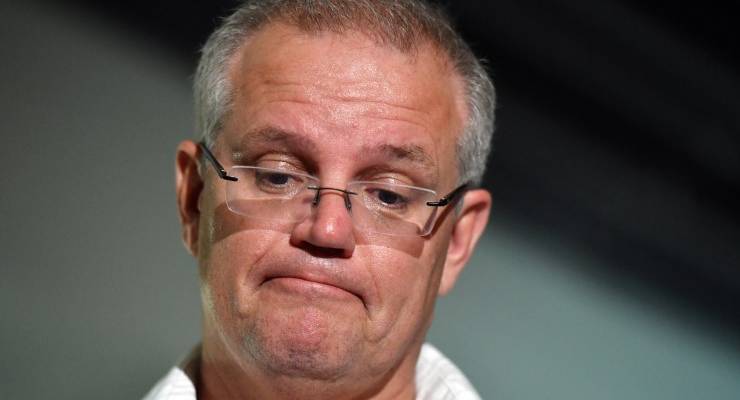
With ScoMo’s latest genius plan — outlawing calls for consumer boycotts of companies on environmental grounds — it’s getting to the point where the government needs not a manager of business, but an air traffic controller to launch and land its endless series of brain bubbles.
The religious freedom nonsense is still in the air, with Attorney-General Christian Porter trying to work out how to allow Catholic hospitals to sack LGBTIQ cafeteria workers without simultaneously protecting LaVeyan satanists’ right to demand a Baalzebub birthday cake from a Methodist bakery.
Meanwhile The Australian is screaming blue murder, because the government’s agents of foreign influence bill has snared hahaha Tony Abbott.
Now we have this new who knows what bill on… is it about environmental protest? About banking investment decisions? About consumer guidance? Who knows. The IMARC protestors were mentioned. But as hahaha Andrew Bolt noted in his column yesterday, there are already ample laws to use against protesters.
How to disentangle commercial motives from political ones in a situation in which there is a commercial argument to not invest in certain industries? Christian Porter is looking at it. As he is at religious freedom. And the ensuring integrity bill.
He is well named, Christian Porter, because he is doing all the heavy lifting for the happy-clappy obsessions of his prime minister. When’s he going to have some self-respect, as a liberal-conservative, and arc up at this junk? Because junk it is. It’s another bespoke restriction on free activity, perversely presented as a championing of freedom.
Reverse-engineered from a desired result — that brown energy should not be excluded from investment or consumer choices — it appears to be geared to solving an internal political problem. That is the rising panic of the National Party over the anger of their constituents, prompted by drought and rural unemployment.
The language of ScoMo’s pledge also has a touch of the Pentecostal “gospel of prosperity” to it — the notion that commerce is good in the eyes of the Lord, without any consideration of what end the commerce is serving.
The commitment to cracking down on street protest is purely for show of course. Those are largely state matters, and devolves to police operational procedure. The cops could have arrested all 300-400 protesters at IMARC. They chose not to, not out of respect for public protest, but because they would have needed 200+ cops and a dozen vans to do it.
As the conference entrance wasn’t blockaded, they decided to contain the protest, and got a bit aggro on the final day. The government could bring in draconian and specific penalties for protest — five years, 10 years — but they would still have to reach down and micromanage police response. Good luck doing that.
Laws to compel businesses to provide services to other businesses will be even trickier. The “secondary boycott” provisions of the 2010 Competition and Consumer Act, rolled over from the 1974 Trade Practices Act, were designed to limit the power of unions to act autonomously in waging industry-wide strikes. But such acts are readily identifiable.
Not so are commercial decisions to not participate or invest in certain activities, since such refusals can themselves be defended as a commercial decision, both as a first-order investment — is the government going to compel banks to waste shareholder money lending on coal mine money pits? — but also as a reputational asset.
Presumably, if a bank or other business can show that refusing to deal with brown energy is necessary to attract other business — like consumers making ethical choices — or is simply part of a strategy to do so, then the secondary boycott provision fails.
In other words, the Morrison government’s strategy is, like all these bespoke anti-freedom campaigns, a desperate one. Like the Israel Folau case, it cuts across commercial practice in a manner rich in unintended consequences.
With that in mind, the worst thing progressives/the left can do is lend these desperate, on-the-fly measures a respectability by talking about sinister, Orwellian moves etc. This is junk lawfare by a perpetually tentative government, terrified of One Nation and rural independents, spooked by a global recession that has already begun, knowing they are sitting on a powder keg of private debt, with no policies besides a tax cut they’ve already delivered. They are now proposing a new law so insta-responsive that they haven’t even worked out the basic mechanics of the relevant bastardry.
The difficulty is that progressives have spent so much time advocating for bespoke laws limiting peoples’ right to speak on a whole range of other topics that they are hobbled in attacking right-wing laws that have an opposite content but take the same form. Whenever one raises this, one gets some snivelling response about imbalance of power myah myah myah etc.
But that is precisely why we need a firm and simple commitment from the left to the most free speech possible, the most freedom of assembly, etc. Otherwise on what grounds, other than personal preference, can one object to such targeted repression?
The ultimate brain bubble is the Morrison government itself. If we can’t burst that, we may as well float away ourselves.
Should the public be worried about Morrison’s proposed boycott ban? Send your thoughts to boss@crikey.com.au. Please include your full name for publication.








Crikey is committed to hosting lively discussions. Help us keep the conversation useful, interesting and welcoming. We aim to publish comments quickly in the interest of promoting robust conversation, but we’re a small team and we deploy filters to protect against legal risk. Occasionally your comment may be held up while we review, but we’re working as fast as we can to keep the conversation rolling.
The Crikey comment section is members-only content. Please subscribe to leave a comment.
The Crikey comment section is members-only content. Please login to leave a comment.